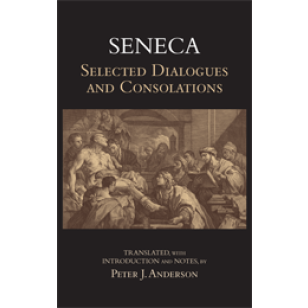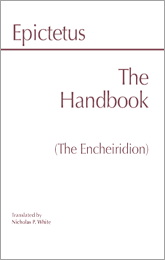Seneca: Selected Dialogues and Consolations
"Were I to include Seneca in a course on the Renaissance or on the Roman origins of our liberal arts ideal I would use Peter Anderson's new translation. The Introduction is excellent: readable and comprehensive. I especially like his discussion of the challenge of translating what he calls Seneca's six key words and their cognates. His lucid overview of the philosophical ideas that informed Seneca's thinking will help readers ponder nature and humanity, the cosmos and the polis, from within Seneca's mind and times. The translation can on occasion be nicely graphic, and thus likely to engage first-time readers, as for example in one of the opening lines of the Consolation to His Mother Helvia: '. . . I kept crawling along (reptare), trying to bind your wounds while I used one hand to keep pressure on mine (manu super plagam meam imposita).'" —Robert E. Proctor, Joanne Toor Cummings '50 Professor of Italian, Connecticut College
"An excellent tool for students and teachers of Latin literature and Stoic philosophy." —Aldo Dinucci, in Archai
Seneca's dialogues—as his epistolary essays have traditionally been known—offer an ideal path into the philosophical thought of first-century Rome's most famous Stoic, whose compelled suicide in 65 CE (by order of his former pupil Emperor Nero) drew comparisons to the death of Socrates.
Notable for, among other things, their portrait of a providential universe and defense of the life of virtue, the nine dialogues included in this volume illustrate the deeply intertwined cosmological and moral arguments of ancient Rome’s chief philosophical alternative to Epicureanism and Academic Skepticism.
Peter J. Anderson's new translation conveys the distinctive character of Seneca's style, while striving for accuracy and consistency in its renderings of key terms. His Introduction discusses the dialogues as works of art and situates them in the context of ancient Stoic philosophy as well as the wider philosophical scene. Notes and a glossary are also included.
Reviews:
"Were I to include Seneca in a course on the Renaissance or on the Roman origins of our liberal arts ideal I would use Peter Anderson's new translation. The Introduction is excellent: readable and comprehensive. I especially like his discussion of the challenge of translating what he calls Seneca's six key words and their cognates. His lucid overview of the philosophical ideas that informed Seneca's thinking will help readers ponder nature and humanity, the cosmos and the polis, from within Seneca's mind and times.
"The translation can on occasion be nicely graphic, and thus likely to engage first-time readers, as for example in one of the opening lines of the Consolation to His Mother Helvia: '. . . I kept crawling along (reptare), trying to bind your wounds while I used one hand to keep pressure on mine (manu super plagam meam imposita).'"
—Robert E. Proctor, Joanne Toor Cummings '50 Professor of Italian, Connecticut College
"An excellent tool for students and teachers of Latin literature and Stoic philosophy.
—Aldo Dinucci, in Archai
Contents:
Introduction
Seneca's Life
Literary Qualities of Seneca's Philosophical Writings
A Note on the Translations
Seneca and Stoicism
The Providential Universe and Virtuous Living
Oikeiosis
Indifferents
Epicureanism
The Dialogues and Consolations
The Addresses
Further Reading
On Providence (De Providentia)
On the Resolute Nature of the Wise Man (De Constantia Sapientis)
Consolation to Marcia (Ad Marciam De Consolatione)
On the Happy Life (De Vita Beata)
On Retirement (De Otio)
On Serenity of the Spirit (De Tranquillitate Animi)
On the Shortness of Life (De Brevitate Vitae)
Consolation to Polybius (Ad Polybium De Consolatione)
Consolation to His Mother Helvia (Ad Helviam Matrem De Consolatione)
Select Biographical Information for Key Individuals
Glossary of Latin Words Used More Than Once
Index of Names
About the Author:
Peter J. Anderson is Associate Professor of Classics, Grand Valley State University.











